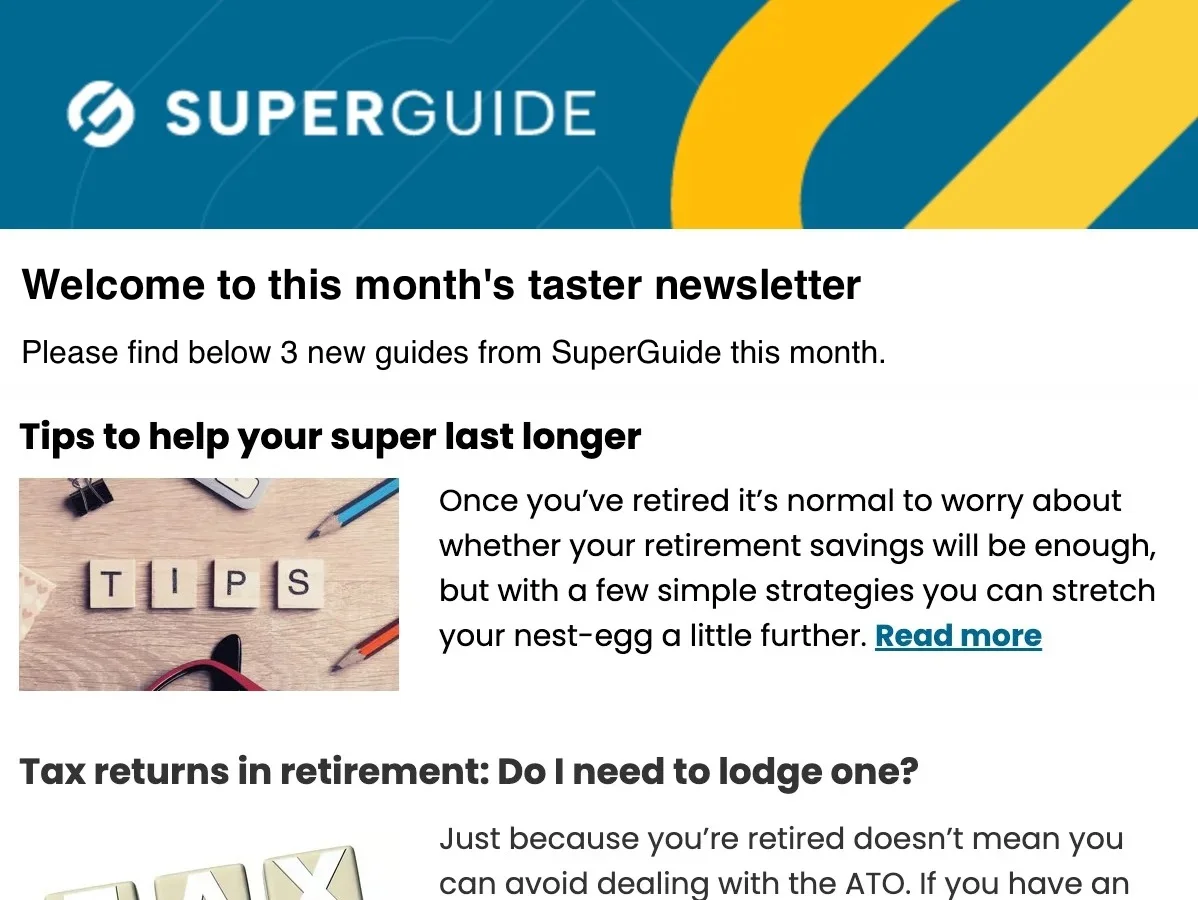In this guide
Many of us focus on the importance of financial planning in the lead up to retirement and forget to review the state of play afterwards.
That’s unfortunate because the right advice in your retirement years can ensure you get the most out of your investments, minimise tax, organise inheritances and even transition smoothly into aged care.
As the push to improve retirement outcomes for super fund members gathers momentum, super funds are increasingly focused on helping their retired members access the advice and help they need to make decisions. So your fund could be a great first port of call when you face decisions or want to understand if you’re making the most of what you have.
How super funds provide advice
Under current regulations, there are two types of financial product advice – general advice and personal advice.
General advice means your personal circumstances are not considered – the advice is not tailored to you. Most super funds provide general advice, and it can be useful to understand more about how to make good decisions about your super. What general advice can’t do is recommend the best course of action for you.
Personal advice is tailored to you. The adviser will collect information about your financial situation and goals and make a recommendation. Most super funds also offer personal advice, but it may come with a fee attached and/or may cover limited topics.
Your fund may employ ‘in-house’ financial advisers to give personal advice to members or may refer you to an external panel of advisers.
Advice about super in retirement
If your super fund can offer you personal advice, it will (at a minimum) cover your super – including both accumulation and retirement phase (pension) accounts.
In retirement, this advice covers three broad categories:
- How to invest your super
- Making contributions
- making withdrawals
In the investment space, you may be able to receive a recommendation on the most suitable investment option (or mix of options) for you from your fund’s menu. Perhaps the mix you chose at retirement is no longer suitable, or maybe you have a bucket strategy in place that needs adjustment. It’s recommended that you periodically review your investments and make any required changes as your needs, risk tolerance and goals change over time.
Advice about making further contributions
Retirement doesn’t always mean the end of contributing to super.

Free eBook
Retirement planning for beginners
Our easy-to-follow guide walks you through the fundamentals, giving you the confidence to start your own retirement plans.
"*" indicates required fields
There are a few contribution opportunities open to retirees that your fund is likely to offer advice about. One of these is the option to make a downsizer contribution if you sell your home. This is available to anyone aged 55 and over and has no maximum age limit, providing a welcome opportunity to add to super and generate additional retirement income.
Anyone under age 75 may also make non-concessional contributions to super, so it’s worth seeking advice if you have a lump sum to invest or want to minimise tax for your future beneficiaries. The bring-forward rule could allow you to make a significant contribution and a recontribution strategy could help with estate planning.
Advice about making withdrawals
When it comes to withdrawals, you might want advice about changing your annual pension payment, starting a new pension or making a lump sum withdrawal. An adviser can complete modelling to estimate the impact on your retirement income and how long your pension may last.
Many people also need advice if their spouse passes away and leaves them a super pension, as this can cause issues with the transfer balance cap.
If you have a super pension but also have money in the accumulation phase, you may need advice on whether to move everything to retirement phase and, if so, how best to achieve that.
Money can’t be added to an existing pension, so advice will consider whether to commence a second pension or stop (commute) the existing pension to combine the money and start a new pension with a higher balance. If you have a pre-2015 pension, commuting it can have impacts on your Centrelink and aged care means testing, so advice is critical.
Supercharge your retirement

Get pension and retirement tips and strategies with our free monthly newsletter.
"*" indicates required fields
There’s always the possibility that your fund’s advice service doesn’t fully cover all these topics, but it is worth asking because you may be able to receive advice at no additional cost or for a small fee in comparison with a full-service adviser.
Advice about other topics
Less commonly, your super fund will be able to offer you advice about your assets outside super and other issues such as comprehensive estate planning, maximising your Centrelink entitlements, and aged care needs including how to fund costs (e.g. selling the family home to pay a lump sum accommodation deposit or taking out a reverse mortgage).
Fees for this type of advice can’t be paid out of your super account, so you will need to pay ‘out of pocket’, though as a retiree you could of course make a withdrawal from your super to pay the bill.
Funds that employ their own full service financial advisers are most likely to offer this type of comprehensive advice. If your fund doesn’t, then you may want to find your own adviser.
In the estate planning space, solicitors can also often provide helpful guidance on the preparation and impacts of wills, enduring powers of attorney and advance care directives.
Next steps
If you have identified a need for some advice, get in touch with your super fund to find out what they can offer you and how they charge for the service.
If you need help your fund can’t provide, find out if they can recommend a suitable adviser for you or consider searching for independent assistance.
Shifting the focus from planning for retirement to planning in retirement is a change of perspective that can pay dividends and ensure you remain comfortable with your strategy.



Leave a Reply
You must be logged in to post a comment.